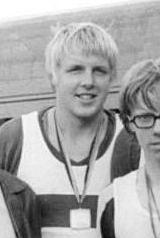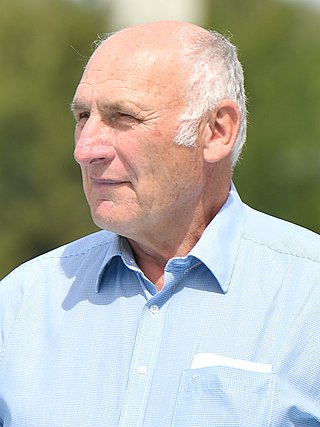Martin Patrick Cross is a British retired oarsman, and current teacher.

Alf John Hansen is a retired rower from Norway. Early in his career, he received two Norwegian sport awards shared with his brother Frank. Towards the end of his career in 1990, he was the inaugural recipient of the Thomas Keller Medal, the highest honour in rowing. His international rowing career spanned more than two decades.
Warren Joseph Cole was a New Zealand rower who won an Olympic gold medal at the 1968 Summer Olympics in Mexico City.
Simon Charles Dickie was a New Zealand rowing cox who won three Olympic medals.
Trevor Ian Coker was a New Zealand rower who won two Olympic medals. He was born in Whanganui, New Zealand. Coker won the European Championship in 1971. Known then as the "New Zealand Eight", Coker and his team received Halberg Awards in 1971 and 1972 as New Zealand Sportsman of the Year.
George Keys is a former New Zealand rower who won an Olympic Bronze medal at the 1988 Summer Olympics in Seoul.
Peter Gregory Johnston, known as Greg Johnston, is a former New Zealand rower who won an Olympic bronze medal at the 1988 Summer Olympics in Seoul. During his rowing career, Johnston has won 26 national championship titles in rowing, and was world champion in 1983 in the coxed four event.
Gerd Cintl was a West German rower who competed for the United Team of Germany in the 1960 Summer Olympics.

Siegfried Brietzke is a German rower. He competed for East Germany, first in coxless pairs, together with Wolfgang Mager, and then in coxless fours. In these events he won Olympic gold medals in 1972, 1976 and 1980, as well as four world championships in 1974–1979.
Peter Berger is a German rower who competed for West Germany in the 1968 Summer Olympics and in the 1972 Summer Olympics.

Hans-Johann Färber is a German rower who competed for West Germany in the 1968 Summer Olympics, 1972 Summer Olympics and in the 1976 Summer Olympics.

Gerhard Auer was a German rower who competed for West Germany in the 1972 Summer Olympics.
Uwe Benter is a German coxswain who competed for West Germany in the 1972 Summer Olympics.
Klaus-Dieter Ludwig, known as Lucky in rowing circles, was a German coxswain who competed for East Germany in the 1972 Summer Olympics and in the 1980 Summer Olympics. He had a long rowing career and competed on the international stage for 19 seasons, retiring aged 41.
Ilona Richter is a German rower who competed for East Germany in the 1976 Summer Olympics and in the 1980 Summer Olympics, winning gold at both occasions.
Marina Wilke is a German rowing cox who competed for East Germany in the 1976 and 1980 Summer Olympics.
Peter Niehusen is the only sportsman to have won international medals as both a coxswain and a rower. He won two gold medals and three bronze medals at the European and World Championships and the 1976 Summer Olympics in Montreal.

The 1972 New Zealand eight was a team of Olympic gold medallists in rowing from New Zealand, having previously won the 1971 European Rowing Championships. At the time, the eight was regarded as the blue ribbon class of rowing, and the sport still had amateur-status in New Zealand, unlike many other nations competing in rowing. After a disappointing Olympic performance at the 1968 Summer Olympics by the New Zealand eight, national selectors Rusty Robertson, Don Rowlands, and Fred Strachan were tasked with assembling a new crew. Robertson was also the team's coach. The next time a New Zealand eight competed was at the 1970 World Rowing Championships, where they came third. The team was once again significantly changed for the next rowing season, with the 1971 edition of the European Rowing Championships and other international regattas beforehand seen as the ultimate test for the 1972 Summer Olympics. The team put up an impressive performance, beat the highly favoured East German eight, and became European champion; at the time the win was regarded as holding world championship status. No further changes were made to the team, not even their seating position, for the 1972 season. Despite a shoe-string budget, financial constraints, and all rowers working part-time, the 1971 success was repeated and the team won Olympic gold in Munich. The president of the International Olympic Committee (IOC), Avery Brundage, was a zealous advocate of amateurism; he was so impressed by the New Zealand performance that he insisted on handing out the gold medals himself. During the medal ceremony, much to almost everybody's surprise, "God Defend New Zealand" was played instead of the national anthem, "God Save the Queen". It was the impetus for a campaign to make "God Defend New Zealand" the New Zealand anthem, and in 1977 it was gazetted as having equal status to the traditional anthem.
Jennifer Walinga is a retired rower who competed between the 1980s to 1990s. As a member of the national rowing team for Canada, Walinga placed 4th at the 1983 Junior World Championships in Vichy, France, 2nd at the 1984 U23 Sr B World Championships in Copenhagen, Denmark, and 5th at the 1985 World Rowing Championships in Hazewinkel, Belgium. In coxed four events, Walinga won gold at the 1986 Commonwealth Games and bronze at the 1986 World Rowing Championships. At the 1987 World Championships, the team placed 5th in Copenhagen, Denmark. She and her crew of Tricia Smith, Heather Clarke, and Jane Tregunno (Stamp) had a seventh place finish in the coxed four at the 1988 Summer Olympics.





